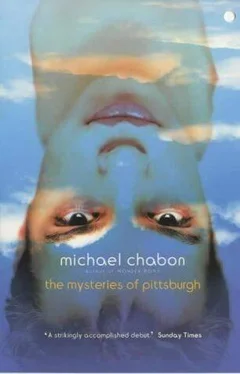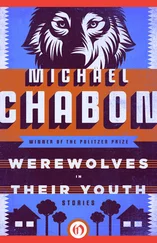Michael Chabon - The Mysteries Of Pittsburgh
Здесь есть возможность читать онлайн «Michael Chabon - The Mysteries Of Pittsburgh» весь текст электронной книги совершенно бесплатно (целиком полную версию без сокращений). В некоторых случаях можно слушать аудио, скачать через торрент в формате fb2 и присутствует краткое содержание. Жанр: Современная проза, на английском языке. Описание произведения, (предисловие) а так же отзывы посетителей доступны на портале библиотеки ЛибКат.
- Название:The Mysteries Of Pittsburgh
- Автор:
- Жанр:
- Год:неизвестен
- ISBN:нет данных
- Рейтинг книги:5 / 5. Голосов: 1
-
Избранное:Добавить в избранное
- Отзывы:
-
Ваша оценка:
- 100
- 1
- 2
- 3
- 4
- 5
The Mysteries Of Pittsburgh: краткое содержание, описание и аннотация
Предлагаем к чтению аннотацию, описание, краткое содержание или предисловие (зависит от того, что написал сам автор книги «The Mysteries Of Pittsburgh»). Если вы не нашли необходимую информацию о книге — напишите в комментариях, мы постараемся отыскать её.
The Mysteries Of Pittsburgh — читать онлайн бесплатно полную книгу (весь текст) целиком
Ниже представлен текст книги, разбитый по страницам. Система сохранения места последней прочитанной страницы, позволяет с удобством читать онлайн бесплатно книгу «The Mysteries Of Pittsburgh», без необходимости каждый раз заново искать на чём Вы остановились. Поставьте закладку, и сможете в любой момент перейти на страницу, на которой закончили чтение.
Интервал:
Закладка:
One cigarette later, I heard the loud, slobbering cough of Cleveland 's motorcycle. He popped the curb at the end of the Schenley Park bridge, and I started over to him, but then I saw that he'd killed the engine and was swinging off the saddle and hanging his helmet on the bar; so I stopped, and stood, and waited some more.
We shook hands, then he walked right past me, up to the padlocked gate of the Cloud Factory, where he put his fingers through the diamond-shaped gaps in the fence and looked up at the magic valve. I went to stand beside him, but watched his face and not the hissing white production, except for what I could see of it in the lenses of his eyeglasses. He was unshowered, his long hair limp and sticky, a black smudge on his cheek. From something about the expression on his face, the tense fold of his eyelids, the dry lips, I guessed that he was hung over, but he smiled up at the infant clouds and rattled the gate-happily, I thought.
"Careful," I said. "You might tear it off."
"I did once."
"Sure."
"You know, this damn Cloud Factory…" He tightened his grip on the wire and pulled.
"What?"
He looked at me. I watched his knuckles turn pale.
"Do you know where I'm taking you today?"
"I guess. Cleveland, what?"
"I'm broke, Bechstein, I don't have a dime." His voice sounded sandy.
"So? Look, I know why people start working for Uncle Lenny."
"No, you don't." He pulled harder on the thick wires of the fence. "No, you don't. To hell with money. And from hell with money. To and from hell with money. I'm broke…" His voice trailed off. "Something has to change. I love Jane, Bechstein."
I saw now that he was not just hung over; he was still drunk. He probably hadn't been to bed yet.
"You always tell me you love Jane when you're drunk." He didn't answer. "Okay, so let's go, Virgil. Shock me."
We went over to the big black BMW, leaving behind us two hand'sized bulges in the fence. You could still make them out from fifty yards away, two little blurs in the pattern of wire.
We rode through strange sections to a part of the city that I hardly knew. I knew, in fact, only that there was another good Italian restaurant somewhere around there; my father often mentioned it. We were at the foot of one of the hillside neighborhoods, its houses sparse up along the distant ridge, but coming thicker and thicker toward the bottom, like a cataract, one atop another, sideways and backward and connected by crazy catwalks and staircases, and all tumbling downhill to the river-the Allegheny or the Monongahela, I was not sure which. I made out some children playing on one of the few high streets that cut across the hillside, and a car, and two women talking on a far back porch.
Before he stopped the engine, Cleveland said something I didn't catch. In the sudden silence I asked him to repeat it.
"This, this is my country," he said, with a broad Charlton Heston sweep of his arm, "and these, these are my people."
We started up one of the concrete stairways, which shifted back and forth among the knots of houses, all the way to the top; it looked like a long way.
"There's a road, but I like to make a stealthy approach. Don't worry, we only have to go as far as the Second Circle." His heels tocked concrete, steadily, slowly, and our breath came more quickly with each landing.
"Is this a poor neighborhood?"
"About to get poorer."
"How much poorer?"
"Depends on the vig."
"The vig."
"Depends."
"Oh."
That was it for a while. Cleveland stopped once and mopped his forehead with a rose bandanna. He said the agents in his bloodstream were being oxidized too quickly. We were up in the midst of things now, and I looked back down to the motorcycle, and beyond it to the river, its water the color of the water in a jar of used paintbrushes.
"The lovely Monongahela, " I said.
"That's the Allegheny, Doctor Fact," said Cleveland. "Okay, I'm better now. Come."
Another few minutes of silent climbing brought us to a long road that ran perpendicular to the staircase. On the left the road curved all the way down the hill, and on the right it rose to the ridge, which, I now saw, was not as sparse as it had seemed from the bottom. There was a church up there, with a big red sign that said Jesus did something: saved, lived, gave-I couldn't make out the verb. Cleveland and I gasped for a few moments, then I followed him up the road. Two motorcycles flew past with a huge racket, and we hugged the shoulder to get out of their deafening way. They came extremely close, the near bike with its helmeted enormous rider almost nicking my hip. Cleveland tried to pound its back fender as it pulled away.
"Assholes. Jesus, I just relived every cigarette I ever smoked," he said, panting.
" Cleveland, why are you taking me here? Do I need to see this?"
"What do you think you're going to see?"
"Sad people."
"Never hurts to see sad people. Anyway, it'll give you something to tell your dad."
"Right." Dad. "Do you know what my dad would say if I told him I made the rounds with one of Lenny Stern's pickup boys? He'd say, 'I want you out of Pittsburgh. You've developed too many unsavory associates.' No, he'd say, 'Are you doing this to punish me, Art?'"
He spun and faced me. "I told you I'm not Lenny Stern's anything."
"Okay, okay."
"And what-is your father ashamed of what he is?"
"I'm ashamed."
"Well, maybe I'll tell him what we've been up to, then. You know I want to meet Joe the Egg."
I must have flinched at this nickname. "So you've said. "
"Sorry," he said, not very apologetically. "Look, here we are."
We reached the first house in a row of houses all built across the tiny stretch of earth that lay between the road and nothing, empty air. The houses were supported at the rear by an intricate and feeble-looking system of peeling gray two-by-fours that worked their capricious way down to concrete anchors set into the hill. The greenish paint was also peeling from the side of the first wooden house, which had one newspapered window cut into it, toward the top. We picked our way to the front door along a cracked walk littered with old toys, an enormous Sony television carton, and a soggy pink sneaker.
"I really would like to talk to your father," he whispered, knocking.
" Cleveland."
He patted me once on the shoulder, and then tapped again on the door, with the same hand.
The woman who answered Cleveland 's three lazy knocks had a nice smile that lasted for the fifth of a second before she realized who was at the door.
"He ain't here," she said, looking back and forth between us several times, not nervously but with annoyance, and as though memorizing our faces.
"Well, I am." There was an instant and very convincing meanness to his voice. "And there is that invisible man who has been so generous to your brother. He's here too. In spirit."
She glanced at me before realizing whom Cleveland meant: probably not Uncle Lenny, or whoever was over him, but one of the Stern soldiers. The woman, or girl- she looked about sixteen-had narrowed the space between the door and the jamb, and drawn her body back into the house, so that now only her face showed.
"Who is it?" a man shouted from somewhere within.
The girl blushed. Cleveland smiled.
"Wait," she said, and shut the door in our faces.
"Come in? No, thank you; I'll just wait right here on the porch." He turned toward me and smiled again, lit a cigarette, and leaned against the crumbling side of the house.
"Get a load of this ménage," he said. "I always come here first; it's my favorite."
"Ha."
"They're your father's kind of people."
"Come on, Cleveland, stop."
This time a tall, unshaven young man in an undershirt, with long black hair like Cleveland 's, opened the door, wide. His smile did not fade as his sister's had, but lingered too long, big and yellow and pitiful.
Читать дальшеИнтервал:
Закладка:
Похожие книги на «The Mysteries Of Pittsburgh»
Представляем Вашему вниманию похожие книги на «The Mysteries Of Pittsburgh» списком для выбора. Мы отобрали схожую по названию и смыслу литературу в надежде предоставить читателям больше вариантов отыскать новые, интересные, ещё непрочитанные произведения.
Обсуждение, отзывы о книге «The Mysteries Of Pittsburgh» и просто собственные мнения читателей. Оставьте ваши комментарии, напишите, что Вы думаете о произведении, его смысле или главных героях. Укажите что конкретно понравилось, а что нет, и почему Вы так считаете.












